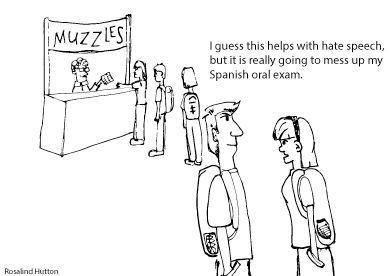College students are witnessing the beginnings of the demise of the right to freedom of speech, promised by America’s founders over 200 years ago.
According to the Constitution, “Congress shall make no law… abridging the freedom of speech.” Freedom of speech is legally absolute, but university administrators seek to undermine the constitution itself through their own campus policy, these policies are called speech codes.
The Foundation for Individual Rights in Education, or FIRE, define speech codes as “any campus regulation that punishes, forbids, heavily regulates or restricts a substantial amount of protected speech.” The intention behind these regulations is to protect students from offensive or “hate” speech. However, administrators refuse to accept that in protecting the sensitivities of one student, they are emasculating the rights of another. If universities do not abolish speech codes holistically, we will witness the death of civil debate and the free exchange of ideas.
Using scare tactics and unconstitutional threats against students for speaking freely, universities are suppressing controversial opinions and freedom of thought.
Countless examples, each case more ridiculous than the last, can be found in FIRE’s archives of universities’ practicing invasive speech codes and dismantling students’ individual rights. According to FIRE’s Archives, at Syracuse University, a fraternity participated in a satirized skit presenting one of its members a racist.
A recording was put on a private Facebook page and Syracuse disbanded the chapter as violating the university speech code. At the University of Kansas, a nonprofit art installation called “Pledges of Allegiance” was censored due to the demands of some Kansas politicians. Long Island University called a student to a mandatory meeting to discuss conduct after he was seen holding unloaded guns in an off-campus Facebook video the previous summer.
These are only examples from 2018. When did political satire, patriotism and recreational shooting become such grave crimes to the point of a university deeming it necessary to involve itself in a student’s personal life? Today’s universities have acquired powers eerily similar to that of Orwell’s Big Brother, constantly monitoring and always watching to ensure all students fit the mold of an ideal.
Not only do students live in fear of university retaliation for exercising their constitutional rights, they are also deprived of contrary viewpoints and different opinions granted by free speech. Speakers on both sides of the aisle are protested and then disinvited by universities for the dangers they are believed to pose and the outrage they could instill in their student population. Ben Shapiro, an established conservative columnist and editor of the Daily Wire is one such speaker.
At the University of California at Los Angeles, according to Business Insider’s Abby Jackson, critics of Shapiro “claimed his proposed lecture–about microaggressions, Black Lives Matter, and safe spaces–was not a debate but an attack.” As a result, students protested Shapiro for his opinions, and the university disinvited him from speaking.
The simple idea of wishing to have an educated discussion about controversial topics and opposing ideology along with the outcry from the loud minority of offended college students scared the university into cancelling the visit of one of the most accomplished speakers of our generation. Depriving students of the opportunity is academically dishonest, willfully deceptive and defeats the very purpose a university education is supposed to provide.
Highlighting the disservice university speech codes do to college students is essential to defeating this injustice. Demonizing a viewpoint that a college may disagree with alienates students and causes persecutions for the way one thinks, which is far more discriminatory and offensive than any harsh remark or hate speech could have ever been.
We are breeding a culture that is afraid to debate one another, one that is afraid to question the preconceived idea of what a college student is and what a college student should believe. The time has come to reclaim the power, to reclaim the First Amendment and reclaim the right to proudly say “I disagree.”
The death of debate: how university speech codes killed free speech

The death of debate: how university speech codes killed free speech




















































































